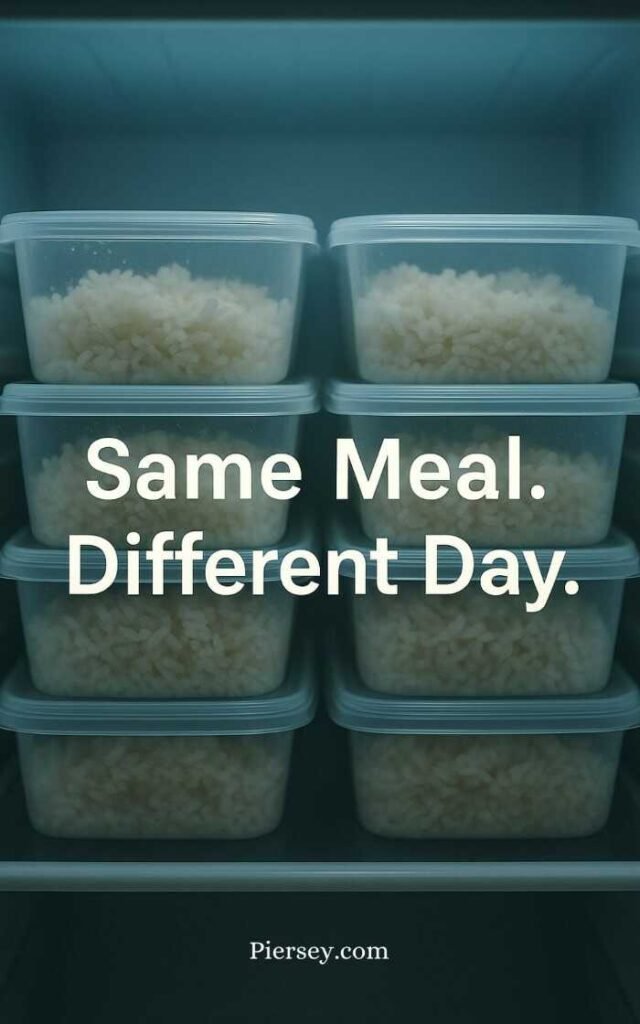Everyone thinks the hardest part of the Rice Diet is eating plain white rice every day — or that you’ll be starving by lunchtime. That’s exactly what I expected when I started this high-carb, low-fat, plant-based experiment. But here’s the twist — that wasn’t the struggle at all.
For 30 days straight, I’ve eaten rice, fruit, and juice while dropping weight, improving energy, and feeling way lighter than before. But the thing that really tested me? It wasn’t hunger. It wasn’t the bland food. It was the mental side — rewiring my brain after years of believing carbs were the villain.
I remember that first week vividly. Standing in the kitchen, looking at a bowl of plain rice, and thinking, this can’t possibly work. I’d spent almost a decade eating steak, butter, and eggs. Now I was eating rice with jam? It felt like a bad joke. But somewhere between frustration and curiosity, I realised — this wasn’t just about food. This was about unlearning everything I thought I knew.
👇 If you’d rather watch the video version, it’s right below 👇
Busting the Obvious Myths
Let’s start with what wasn’t hard.
Hunger? Barely an issue. Rice and orange juice actually kept me full for hours. It blew my mind that such simple food could be that satisfying.
Blandness? Okay, sure — nobody’s mistaking ketchup-rice for fine dining. But after a week, my taste buds chilled out. Plain rice with jam? Weirdly comforting.
Low energy? Nope. I’ve had steady energy all month. No carb crashes, no dragging myself through the day, none of that “I need coffee just to survive” feeling.
So yeah — those classic complaints weren’t the real obstacle. The toughest part of this high-carb lifestyle had nothing to do with my stomach and everything to do with my head.
(I’ve actually gone through this same kind of mindset battle before in Stop Relying on Willpower to Lose Weight — the mental game always matters more than the meal plan.)


The Real Hardest Part — The Mental Shift
Going from 2–3 pounds of beef a day to rice and fruit was like switching planets. For years, meat wasn’t just food — it was part of my identity. Now suddenly I’m measuring out rice cups and diluting orange juice. Physically, it’s easy; mentally, it’s like breaking up with your old self.
I didn’t realise how much of my confidence and structure came from food until I stripped it all away. Cooking used to be a daily ritual — sizzling pans, that smell of butter, the satisfaction of searing meat. Then overnight it vanished. My kitchen became almost silent. And it sounds dramatic, but that quiet felt uncomfortable at first.
Take the average person. Offer them a butter-seared steak or a bowl of basmati rice with jam — which do you think they’ll pick? Exactly. That’s what makes this diet so tough. You’re not just changing meals; you’re changing memories, habits, and social rituals.
And that social part is real. Tell friends or family you’re living on rice and fruit and they look at you like you’ve joined a cult. No one means to be unsupportive — they just don’t get it. Food is a bonding tool, and when you step outside the norm, you notice how much life revolves around it.
I haven’t shown up to a BBQ with a Tupperware of plain rice (yet), but let’s be real — I’d stand out. When you eat the same five foods every day, you start realising just how food-centric everything is. It’s not about feeling hungry — it’s about feeling different.
(That sense of isolation reminds me of what I talked about in The Brutal Truth About Keeping Weight Off — the world doesn’t always make it easy to stay on track.)
How I Handled the Mental Game
The only thing keeping me grounded was remembering my “why.” I’m not doing this because rice and juice excite me. I’m doing it because my body needed a reset. I want to lose weight, lower iron levels, ease the pressure on my liver, and give my spine a break. Simple as that.
When I focus on that reason, the monotony doesn’t bother me. Every day that I stick to it, I build momentum. And honestly, there’s something peaceful about not thinking about food 24/7.
I used to spend hours planning meals, researching supplements, obsessing over macros. Now it’s: cook rice, eat, move on. That simplicity has been strangely healing. It’s given me back so much mental bandwidth. I don’t scroll recipes or chase new diet trends. I just live my life.
(I wrote about this same feeling in The Lazy Way to Get Leaner (That Actually Works) — simplicity beats motivation every time.)
That said, I’d be lying if I said I never get bored. There are moments where I smell someone else’s cooking and my brain lights up like, “Hey… remember flavour?” But then I think about how I feel — lighter, calmer, more stable — and I realise the trade-off’s worth it.
The Hidden Benefits of the Hard Parts
Here’s the funny thing: the very parts that make the Rice Diet hard are also what make it work.
Because it’s so monotonous, I’m not constantly battling food cravings or decision fatigue. My mind feels quiet for the first time in years. I used to scroll recipes for fun — now I barely think about food outside of mealtimes.
And with less noise around eating, I’ve noticed other changes too. I sleep better. My focus during the day is sharper. I’m not riding the highs and lows of food reward anymore — there’s just calm. I used to think “boring” food meant suffering. Now it feels like freedom.
It even reminds me of my old carnivore days — different foods, same minimalism. Strip things back to basics and you see what actually matters. That’s what this diet does — it turns eating into fuel instead of entertainment.
And sure, cravings still pop up. They always will. But they’re manageable now. When you take away the hyper-palatable stuff, you realise how much of your hunger was just habit.
Sometimes I’ll catch myself finishing a bowl of rice and thinking, “That’s it? I’m good?” It still surprises me. Food used to control every part of my day; now it feels neutral.


Final Thoughts
So yeah — the hardest part of the Rice Diet wasn’t the plain meals or the lack of flavour. It was the mental side: the simplicity, the social awkwardness, and the realisation of how much life revolves around food.
But weirdly enough, that’s been the best part too. It’s helped me untangle years of food baggage and learn that discipline can actually feel peaceful. This isn’t just about the 19 pounds I’ve lost so far — it’s about changing how I think about eating altogether.
I’m still learning, still experimenting, and still very much on this journey. But I can honestly say, the mental growth from this has been just as valuable as the physical transformation. It’s shown me that food doesn’t have to rule your life — it can simply support it.
And if you’re struggling with food addiction, weight loss frustration, or the constant noise of diet culture, maybe try simplifying everything for a while. You might be surprised at what quiet feels like.
Because the truth is — this isn’t really a diet story. It’s a mindset story. And for me, that shift has changed everything.

